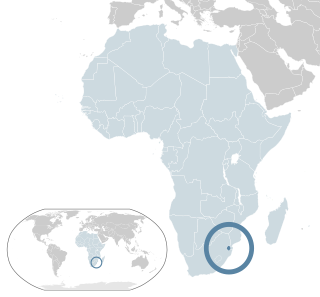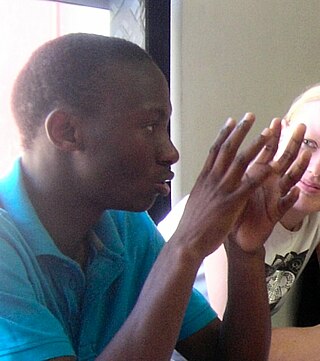Related Research Articles

Eswatini, officially the Kingdom of Eswatini and also known by its former official name Swaziland and formerly the Kingdom of Swaziland, is a landlocked country in Southern Africa. It is bordered by Mozambique to its northeast and South Africa to its north, west, south, and southeast. At no more than 200 km (120 mi) north to south and 130 km (81 mi) east to west, Eswatini is one of the smallest countries in Africa; despite this, its climate and topography are diverse, ranging from a cool and mountainous highveld to a hot and dry lowveld.

Artifacts indicating human activity dating back to the early Stone Age have been found in the Kingdom of Eswatini. The earliest known inhabitants of the region were Khoisan hunter-gatherers. Later, the population became predominantly Nguni during and after the great Bantu migrations. People speaking languages ancestral to the current Sotho and Nguni languages began settling no later than the 11th century. The country now derives its name from a later king named Mswati II. Mswati II was the greatest of the fighting kings of Eswatini, and he greatly extended the area of the country to twice its current size. The people of Eswatini largely belong to a number of clans that can be categorized as Emakhandzambili, Bemdzabu, and Emafikamuva, depending on when and how they settled in Eswatini.

Mswati III is Ngwenyama (King) of Eswatini and head of the Swazi royal family. He heads Africa’s last absolute monarchy, as he has veto power over all branches of government and is constitutionally immune from prosecution.

The People's United Democratic Movement is the largest opposition party in Eswatini. It is a democratic socialist party. Formed in 1983 at the University of Eswatini, it is led by Mlungisi Makhanya.
Mario Thembeka Masuku was a Swazi politician who was the leader of the People's United Democratic Movement (PUDEMO), Eswatini's banned opposition party.

Lesbian, gay, bisexual, and transgender (LGBT) people in Eswatini have limited legal rights. According to Rock of Hope, a Swati LGBT advocacy group, "there is no legislation recognising LGBTIs or protecting the right to a non-heterosexual orientation and gender identity and as a result [LGBT people] cannot be open about their orientation or gender identity for fear of rejection and discrimination." Homosexuality is illegal in Eswatini, though this law is in practice unenforced. According to the 2021 Human Rights Practices Report from the US Department of State, "there has never been an arrest or prosecution for consensual same-sex conduct."
The Swaziland National Union of Students is a membership-based organisation of students in all higher institutions of learning in Swaziland. It seeks to create a student movement and geared to confront the socio economic and political challenges of the country. The organisation also advocates an education policy that is informed by the economic demands faced by the country and the democratisation of Swazi society.
The Swaziland United Democratic Front is a coalition of pro-democracy interests including political parties, unions and churches. The Swaziland United Democratic Front was formed on 2 February 2008 at the Tum's George Hotel in Manzini, Swaziland, attended by 120 persons from various organizations but mainly from the following:
The Swaziland National Ex-Mine Workers Association (SNEMA) is an organisation of ex-miners, who at one point were employed in mines in South Africa. The organisation has over 700 members. Many of the members have sustained injuries or illness from working in the mines, and have been declared redundant. And many of the ex-mineworkers have not been compensated for these injuries or paid the pensions they are due.
Swazi Media Commentary is a blog written by former associate professor in journalism and mass communication at the University of Swaziland, Richard Rooney. The Blog discusses and informs about the political and human rights situation in Swaziland, focusing primarily on media freedom and the ethical issues of journalism practitioners in newspapers and other media.

Sipho Jele was a member of the banned Swazi political party People's United Democratic Movement (Pudemo) as well as the Swaziland Agricultural and Plantations Workers Union (SAPWU), part of the Swaziland Federation of Trade Unions (SFTU). He died in police custody in Swaziland, after having been arrested on 1 May 2010, at the SFTU May Day celebrations, for having worn a T-shirt with a Pudemo logo. Sipho Jele was found hanging from the rafters of a toilet at the Sidvwashini Correctional facility where he was being held on 4 May.
Prince Sozisa Dlamini of Swaziland was Chief of Gundvwini. He became the Authorized Person of Swaziland from 1982 to 1985 after the death of King Sobhuza II, and in 1983 was briefly the acting Regent of the country, after he deposed Queen Dzeliwe. From 1983 he was Authorized Person to the new Queen Regent, Ntfombi, with greater powers. Although lacking the title, he was for most purposes the de facto ruler of the country. He fell from power in July 1984, after being accused of planning a coup, and was suspended as Authorized Person until Queen Ntfombi terminated his appointment on 1 November 1985.

Maxwell Dlamini is the Secretary General of SWAYOCO and the former President of the University of Swaziland Students Representative Council. During the so-called "April 12 Swazi Uprising" in April 2011, he and fellow activist Musa Ngubeni were arrested on charges of possession of explosives under Sections 8 and 9 of Swaziland’s Explosives Act 4 of 1961. They were both allegedly tortured and were subsequently refused bail. They were imprisoned at the Manzini Remand Centre.
Wander Mkhonza is the Secretary General of the Amalgamated Trade Union of Swaziland (ATUSWA). He has previously served as the national leader of the banned and largest political party in Eswatini, the People's United Democratic Movement (PUDEMO). He was elected the National Organising Secretary at PUDEMO's 2011 congress. Prior to this position he was the Deputy Secretary General, a position he held till the last congress. He has served PUDEMO in various levels including chairperson of Nhlangano Branch of PUDEMO, Chairperson of the Shiselweni Region of PUDEMO, which is also the home region of the President Mario Masuku. Mkhonza also sits in the National Disciplinary Committee of PUDEMO.

The Trade Union Congress of Eswatini (TUCOSWA) is a Swazi trade union federation.

The Swazi Democratic Party, also known by its abbreviation SWADEPA, is a political party in Eswatini led by its president Jan Sithole. SWADEPA was established in 2011 and took part in the 2013 parliamentary elections in Swaziland by putting up candidates running as individuals.
Thulani Rudolf Maseko was a Swazi human rights lawyer who was imprisoned from 2014 to 2015, and declared a prisoner of conscience by Amnesty International. He launched a court challenge to King Mswati III of Eswatini in 2018 and was assassinated in 2023.
A series of protests in Eswatini against the absolute monarchy and for democratisation began in late June 2021. Starting as a peaceful protest on 20 June, they escalated after 25 June into violence and looting over the weekend when the government took a hardline stance against the demonstrations and prohibited the delivery of petitions. Lower-level unrest and protests continued until summer 2023.
Glory Lefoshie Sedibe, popularly known as Comrade September, was a member of the African National Congress (ANC) and a senior Umkhonto we Sizwe (MK) operative who in August 1986 was abducted by an Apartheid death squad led by Eugene de Kock. After being severely tortured while detained in Piet Retief, Sedibe agreed to inform on his ANC comrades, becoming an askari or spy and murdered his own comrades in Vlakplaas with De Kock and others for the Apartheid state. He was a very prominent ANC activist in exile who went by the noms de guerre Comrade September, Lucky Seme and Wally Williams and was also nicknamed Dois M and Sebata.

Zena Soraya Mahlangu is a Swazi royal and the tenth wife of Mswati III. In 2002, when she was eighteen years old, she was abducted by two of the king's men and taken to the Ludzidzini Royal Village to accept royal duties and prepare to become the next royal bride. Her abduction led to a court case and international scandal, with various trade unions, organizations, and public figures, including Amnesty International, condemning the king and royal family's actions. She officially married the king in 2010, taking the royal title Inkhosikati LaMahlangu.
References
- ↑ "Studenterleder fra Swaziland Pius Vilakati fortsat meldt savnet, frygtes dræbt af politiet | AFRIKA KONTAKT". Archived from the original on 2011-04-14. Retrieved 2010-05-20.
- 1 2 "Afrika Kontakt". Afrika.dk. Retrieved 21 August 2017.
- ↑ "The Swazi Observer". Archived from the original on 2011-07-16. Retrieved 2010-05-20.
- ↑ [ dead link ]
- ↑ "Swaziland National Union of Students". swastudents-snus.blogspot.com. Retrieved 21 August 2017.
- ↑ Rooney, Richard (17 May 2010). "Swazi Media Commentary: EYEWITNESS TO ACTIVIST FUNERAL". Swazimedia.blogspot.com. Retrieved 21 August 2017.
- ↑ Rooney, Richard (18 May 2010). "Swazi Media Commentary: FEARS POLICE HAVE STUDENT LEADER". Swazimedia.blogspot.com. Retrieved 21 August 2017.
- ↑ "Swazi student leader still missing". Stiffkitten.wordpress.com. 19 May 2010. Retrieved 21 August 2017.
- ↑ "Times Of Swaziland". Times.co.sz. Retrieved 21 August 2017.